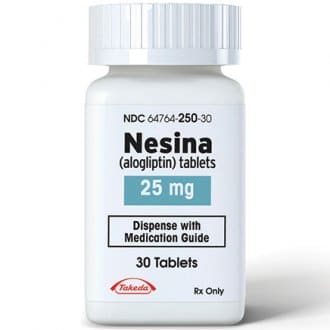What is Nesina (Alogliptin)?
Alogliptin is a medication that is indicated for people with type 2 diabetes who are not achieving sufficient levels of glycemic control for optimal health. An oral antidiabetic drug, it can be used as an adjunct to a good diet and plenty of exercise for type 2 diabetics who cannot use metformin due to contraindications or intolerance.
When diet and exercise alone do not provide adequate glycemic control, alogliptin can be used in combination with metformin, sulfonylureas, pioglitazone, and/or insulin.
The alogliptin brand name is Nesina. The Nesina drug class is dipeptidyl peptidase-4 inhibitor (gliptin). It was developed by Syrrx, which was acquired by Takeda Pharmaceutical Company in 2005. The drug was approved for use by the Food and Drug Administration (FDA) in January 2013.
What is it used for?
Nesina is used by type 2 diabetics to achieve stable blood glucose levels, especially when other antidiabetic agents, like metformin and/or sulfonylureas, do not elicit the desired level of glucose stability.
This medication is not established for safety or efficacy in geriatric patients (>65 years of age) or pediatric patients (<18 years), so use of Nesina or a Nesina generic is not recommended in these groups.
How to take Alogliptin
It is necessary to titrate and closely monitor the dosage of Nesina based on the patient’s renal function and performance. A full assessment of renal function is highly recommended before a patient embarks on therapy with Nesina. These tests should be repeated at regular intervals during treatment to establish an efficacy regime.
No dosage adjustment is generally necessary based on the age of the patient, however dosing should be conservatively administered in patients of advanced age because of the possibility of renal failure.
Nesina side effects
Nesina was generally well-tolerated in controlled clinical studies. Serious side effects were rare. As with any diabetes-controlling medication, Nesina can induce a potentially dangerous state called hypoglycemia. It is unlikely to cause weight gain and the risk of hypoglycemia is low.
Common side effects
- Headache
- Upper respiratory tract infection
- Nasopharyngitis
Severe side effects
- Hypoglycemia
- Hypersensitivity reactions
- Renal impairment
Dosage
Nesina can be administered with or without food and it is taken as a once-daily tablet. The recommended starting dosage of Alogliptin is 25mg daily.
For a patient with moderate renal impairment, the dose is 12.5mg once daily. For severe renal impairment and end-stage renal disease, the dose is 6.25mg once daily.
Doctor’s Recommendation
Do not use Nesina if you have had a severe allergic reaction to alogliptin or its ingredients, as it may cause serious side effects. Inform your doctor if you have kidney or heart failure history before starting Nesina. Contact your doctor right away if you experience increased shortness of breath, trouble breathing while lying down, rapid weight gain, swelling in your legs or ankles, or unusual tiredness. Nesina can also cause severe pancreatitis, so let your doctor know if you have had pancreatitis, liver or kidney problems, high triglycerides, gallstones, or a history of alcohol use.



